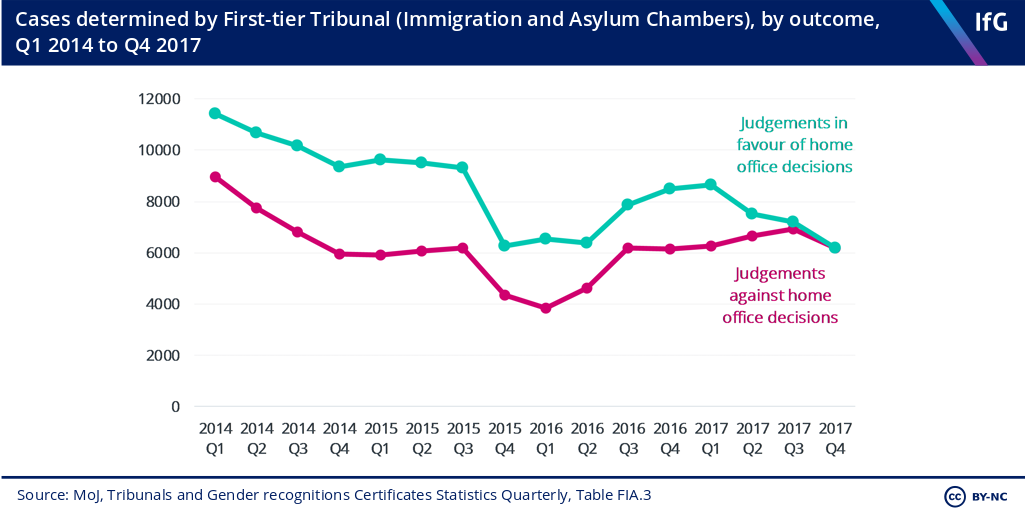The Home Office must drop ‘hostile environment’ approach for Brexit
The current Home Office approach is not compatible with the need to get a huge number of EU nationals registered in a short space of time.
Millions of EU nationals living in Britain will need to apply for ‘settled status’ after Brexit. With tight timelines and groups needing help with their application, Joe Owen argues that Home Office belligerence must end.
When it comes to immigration and asylum, the Home Office modus operandi is ‘hostile environment’. Bureaucracy, complexity and an uncompromising approach to applications is used to make life difficult for many migrants. When the drive was to reduce numbers of immigrants, creating hurdles was perceived as useful tool for putting off potential applicants.
But this hard-line approach has become a way of doing business for the department. With Brexit presenting the Home Office with a new system, millions of potential applicants and a ticking clock, that has become a serious problem.
A new report from the Law Society says the immigration system has “serious flaws”, with around 50% of appeals being found in favour of the applicant. That means that the Home Office is in many cases rejecting applications only to accept them after a lengthy process of tribunal or appeal. This causes unnecessary uncertainty for those left in limbo and comes at a cost to the taxpayer.
The growing rate of judgements against Home Office decisions, as we found in our recent Performance Tracker, also points to a problem with decision making on immigration and asylum applicants, increasing pressure on the courts system.

The current Home Office approach is not compatible with a department that will need to get a huge number of EU nationals registered in a short space of time.
The new settled status process is not about reducing numbers, it is about providing documentation to the overwhelming majority that are here by right. Of course, it needs to identify those that are ineligible, but it should prioritise getting people through the system as quickly and as painlessly as possible. A ‘hostile environment’ won’t work.
The scale of the challenge is becoming clear
The Home Office’s settled status scheme is the first big, high-profile Brexit implementation programme. Another new report, from the Migration Observatory, suggests it will be impossible to get 100% of EU nationals to use the system.
There will be different reasons why. Some can’t, some don’t and some just won’t.
The ‘can’ts’ are those who are unable to apply because of language barriers, age, disability or lack of computer literacy. The Migration Observatory estimates that there could be around 250,000 EU nationals who will struggle with language barriers.
The ’don’ts’ are those who are aren’t aware that they need to apply. These could be children, whose parents don’t realise they need to apply; people who have lived here for at least 30 years and aren’t aware they are still considered EU (rather than UK) nationals; those who already have permanent residence; or those who think they are ineligible. The ‘don’ts’ is potentially the biggest group, with just less than a million children, around 150,000 long-term residents and around 150,000 who already have permanent residence.
The ‘won’ts’ are those that refuse to apply. These might be groups that they think their applications will be rejected or don’t have the information they need, but could be groups who out of principle do not want to engage in the process.
The Home Office needs to reach each of these groups. And it needs to figure out how to do so against a rapidly ticking clock. They need to focus on the different ways to support applicants, not the different ways to reject them.
The Home Office recognises that a shift is required, but making it happen won’t be easy
The Home Office’s reputation precedes it. The EU has been using the Brexit negotiations to try and mitigate against the ‘hostile environment’ – as much of the talk has been on administrative processes as on the rights of citizens. The deal reached contained provisions that were clearly intended to rein in the Home Office, not least the new independent body to oversee complaints against the Home Office.
The Home Office is aware of the challenges it faces, and it’s fair to point out that some notable progress has been made. For example, we know Home Office officials were instrumental in securing citizens’ rights during phase one negotiations. On future migration, the department is working with the Migration Advisory Committee to develop an evidence base. Finally, we’ve heard some positive reports about the new settled status system being developed, from experts who have seen it.
But the test will be the point at which policy becomes delivery, when citizens start making applications (in bulk) for settled status. If they are met by the same old Home Office attitude, the department is itself likely to experience a hostile environment.
- Supporting document
- Brexit_immigration_WEB.pdf (PDF, 339.15 KB)
- Topic
- Brexit
- Keywords
- Immigration
- Country (international)
- European Union
- Department
- Home Office
- Publisher
- Institute for Government